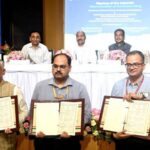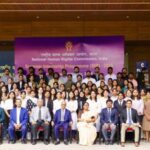
New Delhi : Union Home Minister Amit Shah is scheduled to visit the historic Raigad Fort in Maharashtra this morning to pay homage to Chhatrapati Shivaji Maharaj, the legendary Maratha warrior king, on the occasion of his 345th death anniversary. The visit marks a solemn tribute to the visionary leader who laid the foundation of Hindavi Swarajya and continues to inspire generations across India.
Mr. Shah arrived in Pune last night and will make his way to the Raigad Fort — the capital of Shivaji Maharaj’s kingdom and the site of his coronation as Chhatrapati in 1674. The visit is seen as a symbolic gesture to honour the valour, administrative genius, and indomitable spirit of Shivaji Maharaj, who remains one of India’s most revered historical figures.
Senior BJP leaders and local officials are expected to accompany the Union Minister during his visit. A ceremonial tribute will be paid at the Samadhi (memorial) of Shivaji Maharaj at the fort, which is perched high in the Western Ghats and accessible via ropeway and trekking routes. The event is expected to witness participation from cultural groups, historians, and local residents.
In a post shared earlier, Amit Shah described Chhatrapati Shivaji Maharaj as “a timeless symbol of courage, strategic brilliance, and dharma-based governance.” His visit underscores the central government’s continued efforts to promote India’s rich historical and cultural heritage.
After paying homage at Raigad, Mr. Shah will travel to Mumbai to attend the 75th anniversary celebrations of a prominent Gujarati publication. The event is expected to draw notable personalities from literature, media, and politics, as well as members of the Gujarati community in Maharashtra.
This dual engagement — one rooted in India’s illustrious past and the other celebrating contemporary media milestones — highlights the Union Minister’s outreach to diverse cultural and linguistic communities in the country.
Chhatrapati Shivaji Maharaj’s death anniversary is observed annually with great reverence across Maharashtra, especially at forts associated with his reign. Cultural programs, lectures, and commemorations are held to educate the younger generation about his legacy and ideals of swarajya (self-rule), justice, and people-centric governance.











No Comments: